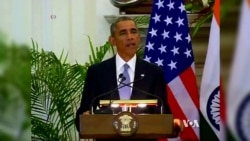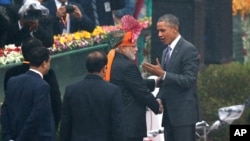U.S. President Barack Obama and India's Prime Minister Narendra Modi broke a deadlock on a long-stalled civilian nuclear pact Sunday, with both leaders noting their "friendship" as the catalyst for closer diplomatic ties.
Hours after arriving in India, the U.S. leader said he and Modi have "agreed to deepen" their defense and security cooperation.
Modi said the relationship between the United States and India "stands at a new level."
The deadlock has been stalling a civilian nuclear power agreement for years, and the action agreed upon is a step that both sides hope will help establish an enduring strategic partnership.
The U.S. signed a deal with India in 2008 to provide civilian nuclear technology. But implementation has been stalled over an Indian law that makes companies that build and supply the equipment liable in case of an accident.
Both sides agreed Sunday to set up a multi-million-dollar insurance pool that does not force India to change its laws.
Details are still unclear. But President Obama called Sunday's agreement an important step that shows how "both sides can work together to elevate our relationship.”
Modi added, "I am pleased that six years after we signed our bilateral agreement, we are moving towards commercial cooperation, consistent with our laws (and) international legal obligations."
Three day visit
Obama will be in India for three days. On Monday, he will become the first American leader to attend the country’s Republic Day ceremony.
The United States views India as a vast market and potential counterweight to China's assertiveness in Asia, but frequently grows frustrated with the slow pace of economic reforms and unwillingness to side with Washington in international affairs.
Elected last May, Modi has injected a new vitality into the economy and foreign relations and, to Washington's delight, begun pushing back against China's growing assertiveness across Asia.
In a veiled reference to China, the leaders reiterated the “importance of safeguarding maritime security and ensuring freedom of navigation and overflight throughout the region, especially in the South China Sea.”
Alo on Monday, the U.S. president will speak at a CEO forum bringing together American and Indian business leaders.
Obama canceled a planned trip to the Taj Mahal to travel to Saudi Arabia on January 27, and will cap his New Delhi visit with a speech earlier Tuesday, laying out his vision for the future of U.S.-India relations.
Aru Pande contributed to this report from New Delhi, India. Some material for this report came from Reuters and AFP.







